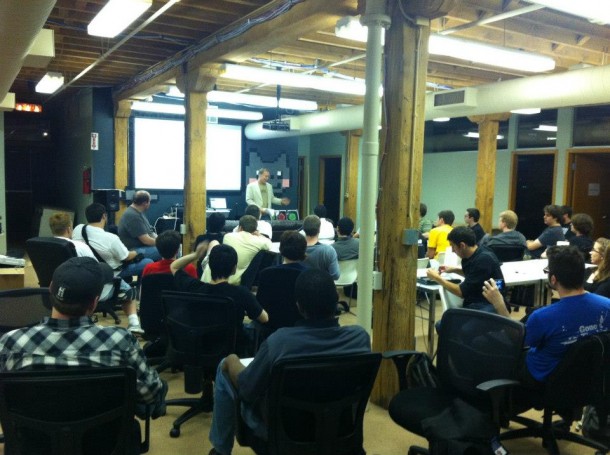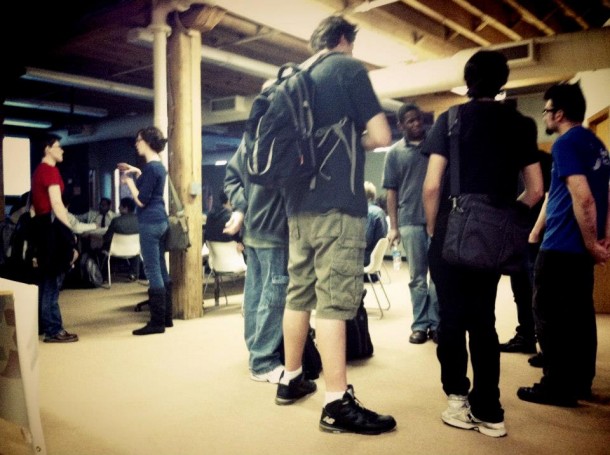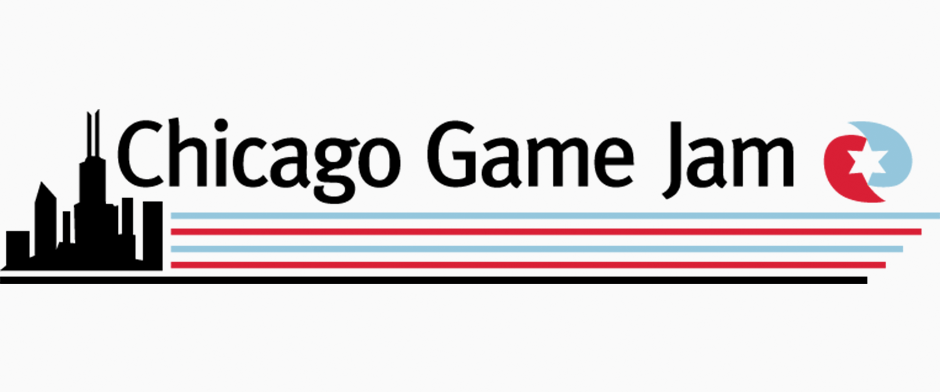
At some point or another, we’ve all felt like taking a lazy weekend off, escaping into the confines of our homes, and curling up to a good game. Just last week, I decided to take the time to marathon through Infamous 2, plowing through it in a matter of days. The Infamous titles were released within two years of one another, and other games have been in development for even longer. As I callously consumed two years of hard work in two days, I started to daydream about the opposite. What about making a game? Could a studio design and develop a game over the course of the weekend? For a group of Chicago-based game developers, it’s possible.
A game jam is a gathering of developers of various disciplines where the objective is to split up into teams and create a game in a short period of time. This weekend, about 30 local game developers took to Chicago’s meat-packing district to flex their creative muscle and make a working game in a matter of 39 hours.
Programmers cracked their fingers, preparing them to speak in various tongues; artists and musicians readied their aesthetic charms; designers and producers would set off to uncover some brave new mechanic. Pack your Mountain Dew and 5-Hour Energy. This is a game jam.

Veteran programmer and Raw Thrills Inc. founder Eugene Jarvis perhaps best-explained the game jam in his keynote on Friday night. He talked about getting into video game programming in the 70s. Back then, developers only had a joystick, one button, and a fistful of a pixels to work with. That night, he stood in front of young, hungry developers as the founder of his own development studio and reminisced about the start of his career at Atari. Of note, he recalled a peculiar co-worker in the neighboring cubicle who seemed to have some body odor issues. That man was Steve Jobs.
Indeed, for both men, greatness came from small beginnings.
He noted that 2012 is an especially exciting time to get into programming with all the different tools that developers have at their disposal. Jarvis acknowledged that numerous creative breakthroughs within the industry recently. “Do you want to be someone who creates an Angry Birds clone? Or are you going to be the person who creates the new, exciting game that everyone is addicted to and can’t stop talking about?” he asked.
The arduous task of building a game from the ground-up in one weekend isn’t to be thought of as some trial by fire. This weekend was a time to be creative. “This is learning by doing,” Jarvis said. “This is the spirit of the game jam.”
[quote]Do you want to be someone who creates an Angry Birds clone? Or are you going to be the person who creates the new, exciting game that everyone is addicted to and can’t stop talking about?[/quote]
After the keynote, the developers were told to create their groups. They scattered to find their co-workers for the next two days and founded their own mini-studios. One group of 10 developers began introducing themselves to one another, diplomatically. People took turns explaining their discipline, education, and experience. This group of ten would then split up into two smaller teams.
Other teams, who were looking to fill in gaps in their studios, began holding small interview sessions.
“What’s your discipline?”
“I’m a programmer.”
“What languages do you know? Can you do anything else?”
Other participants took a less dignified, yet comedic aproach. One loner scribbled “program monkey” on a paper towel and taped it to himself in the hopes of getting recruited by a team. High-fives began to go around as the teams were completed. Eventually, everyone was on a team, ranging in size from groups as large as six and as small as two.

Then the theme of the game jam was dropped. IGDA Chicago chair Jay Margalus took to the center of the room and explained.
“The goal of your game is to lose,” he said.
The developers groaned in unison — half in excitement — as they realized that that one sentence just made the weekend exponentially more difficult. Jay cited games like Lose/Lose and 5 Minutes to Kill Yourself, explaining that the idea of a game where the objective is to lose is an idea that has yet to be thoroughly explored by both the mainstream and indie scenes.
We were raised to think that a game — of any type — is something you play with the hope of winning. Now, they were being asked to create the opposite. Everyone immediately joined with their teammates and started brainstorming on paper and whiteboards. People started coping with the theme and engaged in discussions regarding the nature of winning, losing, and objectives.
I sat there thinking, “This is it. The beginning of a game, way beyond the title screen.”
Join us for Part 2 where we follow three teams as they conceptualize and develop their projects.


1 Comment